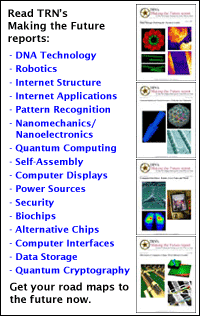
Quantum
Computing: The experimental field of quantum physics and computer science
that manipulates the quantum states of subatomic particles, atoms and molecules
to perform the basic logic operations of computing. Because particles spin
in one of two directions -- up or down -- and these can represent the ones
and zeros of binary computing, particles
can be used as quantum bits or "qubits."
In its quantum state, a particle is not spinning in one direction but has
a probability of spinning in either direction when it leaves the quantum
state. This means that a qubit represents both zero and one at the same
time. Two qubits represent every possible two-bit number (00, 01, 10, 11).
Each additional qubit increases the number of possible numbers exponentially:
n qubits represent 2n possible numbers. Twenty
qubits represent every number from 0 to more than one million, 30 qubits
represent every number from 0 to more than one billion, and 40 qubits represent
every number from 0 to more than one trillion. A quantum computer acts on
a set of particles by influencing the probabilities of the particles' spins
(posing the problem) so that when the particles leave their quantum state
the resulting spins represent a specific number (getting the answer). Quantum
computers have the potential to be much faster than today's supercomputers
because they operate on all the particles -- and thus all the possible numbers
-- simultaneously. So far, researchers have been able to make quantum computers
of only seven qubits, but that has been enough for them to confirm the basic
principles of quantum computing.
Qubit: Quantum Bit. Qubits are individual atoms or subatomic particles. They are the basic units of quantum computing. Particles spin in one of two directions, which can represent the ones and zeros of binary computing.
Qubit: Quantum Bit. Qubits are individual atoms or subatomic particles. They are the basic units of quantum computing. Particles spin in one of two directions, which can represent the ones and zeros of binary computing.
A B C D E F G H I J K L M N O P Q R S T U V W X Y Z
|
||
 |
|
TRN
Newswire and Headline Feeds for Web sites
|
©
Copyright Technology Research News, LLC 2000-2005. All rights reserved.